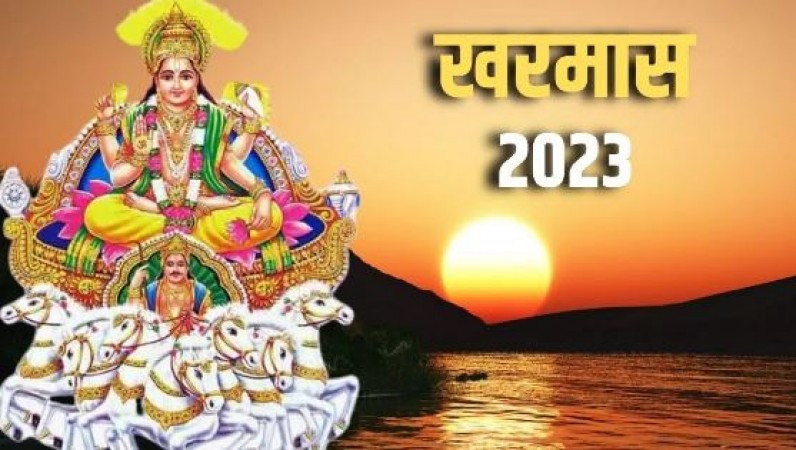
The Kharmas period is a significant phase in Hindu astrology and traditions, marking a 30-day period that begins when the sun transits through the zodiac signs of Sagittarius and Pisces. It is believed that during this time, the sun's influence weakens Jupiter (Brihaspati), a planet associated with auspiciousness. As a result, certain activities are restricted to avoid unfavorable outcomes. The Kharmas period begins on December 16 and concludes on January 16, and its observance is deeply rooted in traditional practices.
Kharmas Explained:
The essence of Kharmas lies in the astronomical alignment of the sun and its impact on the planet Jupiter. Jupiter, also known as Brihaspati, is considered a beneficent planet associated with wisdom, prosperity, and positive influences. However, when the sun transits through Sagittarius and Pisces, it is believed that Jupiter loses its strength, diminishing its auspicious effects. This celestial phenomenon leads to the initiation of the Kharmas period, during which astrological considerations discourage the undertaking of significant and auspicious activities.
Activities Permissible During Kharmas:
Despite the restrictions imposed during Kharmas, there are certain activities that remain permissible according to traditional beliefs. Real estate transactions, such as the purchase of property or plots, are deemed acceptable during this time. Similarly, buying vehicles and even making gold bookings are considered allowable. These guidelines provide a balance between adhering to traditional practices and allowing for essential life activities.
Rules for Kharmas:
Worship and Rituals:
In Kharmas, engaging in worship becomes a focal point of spiritual practice. Individuals are encouraged to participate in puja, paath (recitation of scriptures), and tirtha yatra (pilgrimages). The recitation of sacred texts such as the Bhagavad Gita and Ramayana is considered especially auspicious. Devotees may also perform rituals dedicated to Lord Vishnu, seeking blessings for prosperity and well-being.
Charitable Activities:
Making charitable donations during Kharmas is believed to accumulate merits and positive karma. This could involve supporting the less fortunate, contributing to community projects, or participating in acts of kindness. The emphasis on generosity and selflessness is seen as a means of counteracting any potential negative effects associated with the celestial alignment.
Mantra Chanting and Japa:
The chanting of mantras and the practice of japa (repetition of sacred sounds or names) are common during Kharmas. This serves as a form of meditation and spiritual discipline, helping individuals connect with the divine and maintain a focused and positive mindset. Mantra chanting is considered a powerful tool for invoking positive energies and dispelling negativity.
Devotional Practices:
Devotion to deities, especially Lord Shiva, is highlighted during Kharmas. The period is seen as an opportune time for aradhana (worship) dedicated to Lord Shiva, believed to bring relief from hardships. Devotees may undertake special prayers, visit Shiva temples, and perform rituals to seek divine blessings and protection.
Brahma Muhurta and Surya Arghya:
Rising during the Brahma Muhurta, the auspicious time before sunrise, is encouraged during Kharmas. A cleansing bath followed by the offering of arghya (water mixed with red sandalwood, honey, and red flowers) to the sun deity is a common practice. This ritual, performed in a copper vessel, is believed to invoke the blessings of Surya Dev (Sun God) and is considered highly beneficial for spiritual purification and well-being.
In conclusion, the Kharmas period is a time deeply embedded in Hindu traditions, guided by astrological considerations and spiritual practices. The restrictions imposed during this period aim to align individuals with auspicious energies and celestial influences. While certain activities are limited, the emphasis is on engaging in practices that foster spiritual growth, positive karma, and a connection with the divine.
The diverse set of permissible activities, ranging from real estate transactions to charitable endeavors and devotional practices, reflects a holistic approach to navigating the Kharmas period. Ultimately, the observance of Kharmas is not merely about avoiding certain actions but embracing a mindset of spiritual discipline, devotion, and virtuous living.
Why Goddess Lakshmi Presses Lord Vishnu's Feet: Unraveling the Mythological Story
"Mata Annapurna: Weaving a Tapestry of Love, Abundance, and Spiritual Feast for the Soul"